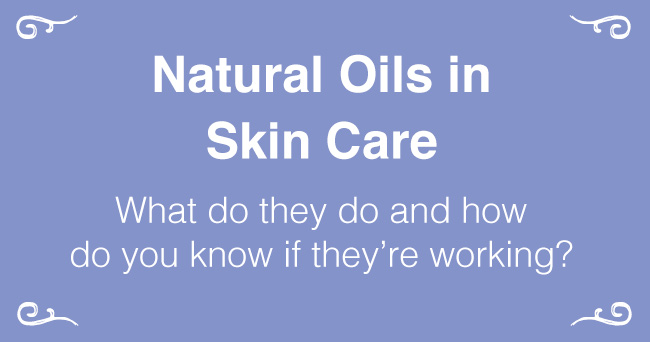Clueless about Skincare Labels? Hashing out natural oils in your skincare products.
I know things about stuff. What’s the purpose of natural oils in your skincare and how do your know if they’re working for you? The list is endless..jojoba, sunflower, almond, lions and tigers and bears, OMG! Reading your skincare labels can be intimidating and confusing. It’s not rocket science, but it seems like a person needs multiple chemistry degrees to understand this stuff. Today we’re focusing on some basics to look for in your skincare. Oils soften, soothe and lubricate the skin as well as protect it from the elements. They are excellent at forming a seal and not allowing the natural moisture of the skin to evaporate. Different oils are appropriate for different uses. The skinny on the fat:
- Plant derived oils penetrate and are absorbed by the skin.
- They also help to lubricate and retain moisture by forming a seal on the skin preventing the evaporation of your natural moisture.
- Natural oils are from seeds, nuts and vegetable sources.
- Oils are a must for every skin type including oily.
Some types of oils you may see in your products:
-
- These are some you might see higher up on your ingredient list. Sunflower, safflower, olive, almond, apricot and grapeseed oils. These oils are liquid and all have nourishing properties for the skin as well help carry the other ingredients to penetrate the skin.
- Most of these common plant derived oils have similar qualities and can be used interchangeably.
- Coconut oil is hard at room temperature but has similar properties as the liquid varieties. It’s also a good substitute for mineral oil.
- Jojoba oil is actually a liquid wax and most like sebum (an oily secretion your skin produces to keep skin moisturized.) Jojoba is always an excellent choice for all skin types and it absorbs readily into the skin without greasiness and does not turn rancid as quickly as some of the other natural oils. But, there is a world-wide shortage of jojoba so prices have increased dramatically over the last couple years.
- A variety of other oils are added in smaller amounts for their rich benefits like anti-aging, skin cell repair etc. You may see oils listed like avocado, cranberry, primrose, borage seed and carrot.
- Mineral oil is a petroleum based product. It does not penetrate the skin but covers it and does not permit the skin to lose moisture, therefore “moisturizing” the skin. It is not a “green” product but can be excellent for dry skin as well as skin in need of repair from extreme weather or recovering from exfoliation. Use coconut oil if you prefer to avoid petroleum based ingredients
Oils for different skin types.
Oily skin: Look for rosehip, jojoba, castor or hazelnut for any oil based product like cleansing oil. For lotions and creams you can use any plant derived oils but I would skip the mineral oil. All oils will clog you pores to some extent but you can combat this by investing in a good clay masque and use it once per week. Normal or combination skin: Use any plant derived oil for your skin care and use clay masque on any problem areas for pore maintenance. Dry or chapped skin: Look for avocado, almond, jojoba, coconut or mineral oil. Use liberally. Sensitive skin: Sensitive skin is a gigantic category so always use a patch test with any new product and build up use when first applying to skin. It all depends on what you’re “sensitive” to. Look for Wheatgerm, sesame, apricot kernel, carrot or avocado. You can also use oils from the more common list like sunflower and olive oil. Mature skin: Look for primrose, avocado, jojoba, carrot, coconut, apricot and borage oils. Choices for oils in your skincare from natural sources are plentiful. Oils are chosen for their price, shelf-life, therapeutic value or “sex” appeal on a label. The ones listed above are some of the most common but most of all the naturally derived oils are all good lubricators and carriers for more performance based ingredients and help them to be absorbed into the skin.]]>
Clueless about Skincare Labels? Hashing out natural oils in your skincare products. Read More »


